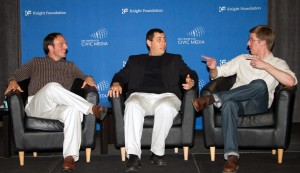Cody Sumter (’10) thinks he can make your smartphone better, and Google believes that he can do it.
Sumter is the co-founder of Behavio, a company that produces software that makes mobile technology more accessible and useful to the everyday user. Behavio is so promising and ambitious that it caught the attention of Google, which recently acquired the company.
“We’ve always looked at someone’s inability to use technology as a user problem,” Sumter said. “Our team saw it as the opposite. The issue wasn’t that people had a hard time understanding technology, but that technology wasn’t able to understand people.”
Sumter uses the example of going for a run with his phone. Taking the time to fiddle with various applications like GPS, a running app and a music player seemed unnecessarily cumbersome while running, and even potentially dangerous, especially since his preferences would change based on his heart rate, intended pace and the surrounding temperature and humidity. Instead, Sumter wanted to focus on a way to make the phone adapt to its surroundings to reflect the phone owner’s personal preference and context.
This style of inquisitive thinking has been propelling Sumter’s career since his time at Truman. After graduation, he moved to Boston to study at the Massachusetts Institute of Technology, where he began working on “The Friends and Family Study,” a research project focused on understanding social and behavioral dynamics of communities through the use of mobile technologies.
Once the data from the project was collected, Sumter and his colleagues decided to open up the mobile sensing software they developed for their research to the public as an open-source platform that can be used by anyone developing smartphone software, particularly those dedicated to social issues like human mobility and disaster relief. The platform was named Funf, a reflection of the acronym used to abbreviate the name of the study.
After its initial launch in October 2011, Funf went on to win the SXSW Accelerator Competition in the News Related Technology track in March 2012, and then received funding from the Knight Foundation. This allowed Sumter and his colleagues, Dr. Nadav Aharony and Alan Gardner, to move to California and start Behavio.
“While Funf provided the sensing layer, our research was really focused around understanding human behavior and social dynamics,” Sumter said. “After having worked on the project for several years, Nadav, Alan and I wanted to take that ability to turn mobile sensor data into meaningful human behavioral insights out of the lab and into the real world.”
After Behavio’s sensory prediction technologies attracted the attention of Google, the small company was integrated into the web giant in April 2013. Sumter explained how impactful this acquisition was for him and his colleagues.
“We went from having a handful of engineers and frugal resources to having relatively unlimited resources while working with some of the smartest minds in the world,” he said. “To me, personally, this opportunity means that the dreams we had of what might be possible in 10 or 20 years suddenly can be thought about on a much nearer time horizon.”

Cody Sumter, right, and colleagues Alan Gardner, left, and Dr. Nadav Aharony, center, unveil Behavio at a joint MIT Media Lab/Knight Foundation event.
Starting something from scratch is nothing new for Sumter. During his time at Truman, he was responsible for bringing Humans vs. Zombies to campus. Among other activities, he served as the student representative on the Board of Governors and was the vice president of Truman’s chapter of the Association of Computing Machinery. Sumter credits the opportunity for these experiences as a major foundation for his budding career.
“When you’re starting a company you have to be able to do everything,” Sumter said. “That can only happen if you’re willing and able to learn new skills as you need them with a developed sense of self-motivation. Truman gave me the opportunities to set my own path and pursue my own passions.”


